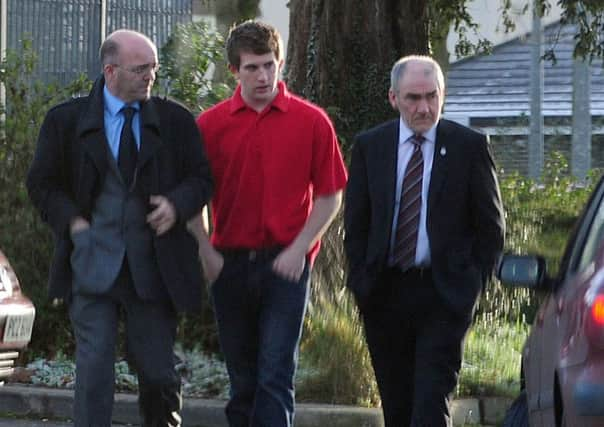Former Tyrone GAA star Sean Hackett successfully appeals sentence for killing father


The 21-year-old was sentenced to life in prison, but ordered to serve at least a decade behind bars, after the manslaughter of his father Aloysius at the family home in Augher in January 2013.
A jury found him guilty last year on the grounds of diminished responsibility after acquitting him of murder.
Advertisement
Hide AdAdvertisement
Hide AdBut senior judges ruled today that Hackett should instead serve seven years before he can be considered for release on licence.
Backing fresh medical evidence that the 21-year-old is suffering from a delusional disorder, they said his culpability for killing Aloysius Hackett was not as high as suggested at trial.
Although the Court of Appeal resisted defence arguments for a hospital order, Lord Chief Justice Sir Declan Morgan said the Department of Justice should urgently consider making a prison transfer to ensure Hackett is treated for his condition.
He said: “There is a compelling need for this young mean to receive appropriate psychotherapy.”
Advertisement
Hide AdAdvertisement
Hide AdAloysius Hackett, a former chair of St Macartan’s GAC in Augher, was shot twice in the head on the driveway of his Aghindarrah Road home.
His son Sean, who previously captained the Tyrone Minor GAA team, admitted carrying out the shooting but denied murder.
At his trial it was said he had suffered depression and up to five psychiatrists backed the view Hackett was in a delusional state of mind when he carried out the killing at the age of 18.
One of the experts called to give fresh evidence was Dr Carine Minne, who is based at the high security Broadmoor Hospital.
Advertisement
Hide AdAdvertisement
Hide AdShe told the court Hackett had been harbouring a secret need to kill either of his parents and is suffering from one of the purest forms of delusional disorder she has ever encountered.
As well as breaking up with a girlfriend, the psychiatrist pointed to the death of a grandparent and the blow to his self-esteem when he wasn’t picked for a football team.
By Autumn 2012 he had developed a belief that killing either of his parents would solve his problems, Dr Minne claimed.
The court heard how Hackett first lured his mother into the family garage in a bid to strangle her, but after coming to his senses told her how unhappy he was and that he wanted her up in heaven.
Advertisement
Hide AdAdvertisement
Hide AdWhen she asked why, he replied: “If you were up there things would be better for me down here.”
Hours before shooting his father he nearly killed his mother again, but was said to have stopped at the last minute because he could not bring himself to do it.
But according to the psychiatrist Hackett was unable to tap into any such anxiety to stop himself shooting his father.
Armed with a rifle, he waited for the victim to return home from a GAA meeting and crouching behind a car, fired three shots.
Advertisement
Hide AdAdvertisement
Hide AdHis father did not die instantly. The blood trail established that he moved 26 feet after the first shot was fired.
In Hackett’s delusional state, Dr Minne claimed, he felt he had to fire again to ensure the victim was dead.
Immediately after pulling the trigger he stood over his father in a calm state of disbelief, unsure whether it was a dream or reality.
Following the killing he walked around the house and returned to scene, apparently to check what had happened was real.
Later he went to neighbours and told them: “Daddy’s dead.”
Advertisement
Hide AdAdvertisement
Hide AdHackett confessed to police after first lying that he found his father’s body and suggesting there had been a burglary.
His mother Eilish was in court, accompanied by other members of the family, to hear the appeal outcome.